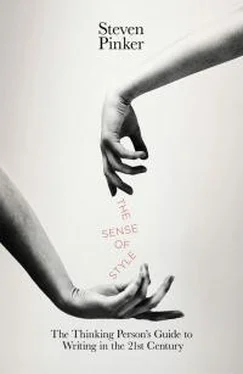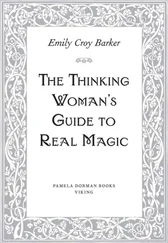But the claim that there is nothing inherently wrong with ain’t (which is true) should not be confused with the claim that ain’t is one of the conventions of standard written English (which is obviously false). This distinction is lost on the purists, who worry that if we point out that people who say ain’t or He be working or ax a question are not lazy or careless, then we have no grounds for advising students and writers to avoid them in their prose. So here is an analogy. In the United Kingdom, everyone drives on the left, and there is nothing inherently wrong with that convention; it is in no way sinister, gauche, or socialist. Nonetheless, we have an excellent reason to encourage a person in the United States to drive on the right. There is a joke about a commuter who’s on his way to work when he gets a call on his mobile phone from his wife. “Be careful, honey,” she says. “They just said on the radio that there’s a maniac driving on the wrong side of the freeway.” “One maniac?” he replies; “There are thousands of them!”
And not even the supposedly descriptivist dictionaries leave their users in doubt as to what the standard forms are. The endlessly repeated claim that Webster’s Third treated ain’t as correct English is a myth. 3It originated in a press release from the publisher’s marketing department which announced “ Ain’t gets official recognition at last.” The dictionary, quite reasonably, contained an entry in which people could learn about the word, including, of course, the fact that many speakers disapprove of it. Journalists misinterpreted the press release as saying that the dictionary listed ain’t without comment.
Another firestorm can be extinguished by recalling that the conventions of usage are tacit. The rules of standard English are not legislated by a tribunal of lexicographers but emerge as an implicit consensus within a virtual community of writers, readers, and editors. That consensus can change over the years in a process as unplanned and uncontrollable as the vagaries of fashion. No official ever decided that respectable men and women were permitted to doff their hats and gloves in the 1960s or to get pierced and tattooed in the 1990s. Nor could any authority with powers short of Mao Zedong have stopped them. In a similar manner, centuries of respectable writers have gradually shifted the collective consensus of what is right and wrong while shrugging off now-forgotten edicts by self-appointed guardians of the language. The nineteenth-century prescriptivist Richard White had no luck banning standpoint and washtub , nor did his contemporary William Cullen Bryant succeed in outlawing commence, compete, lengthy, and leniency . And we all know how successful Strunk and White were in forbidding to personalize, to contact, and six people . Lexicographers have always understood this. In resigning themselves to the role of chronicling ever-changing usage, they are acknowledging the wisdom of Thomas Carlyle’s famous reply to Margaret Fuller’s statement “I accept the universe”: “Gad! She’d better.”
Although lexicographers have neither the desire nor the power to prevent linguistic conventions from changing, this does not mean, as purists fear, that they cannot state the conventions in force at a given time. That is the rationale behind the American Heritage Dictionary ’s Usage Panel: two hundred authors, journalists, editors, scholars, and other public figures whose writing shows that they choose their words with care. Every year they fill out questionnaires on pronunciation, meaning, and usage, and the dictionary reports the results in usage notes attached to entries for problematic words. The Usage Panel is intended to be a sample of the virtual community for whom careful writers write. When it comes to best practices in usage, there is no higher authority.
The powerlessness of dictionaries to enforce the prescriptivists’ dream of preventing linguistic change does not mean that the dictionaries are doomed to preside over a race to the bottom. Macdonald titled his 1962 review of Webster’s Third “The String Untuned,” an allusion to the calamitous violation of the natural order that Ulysses foresaw in Shakespeare’s Troilus and Cressida: “The bounded waters should lift their bosoms higher than the shores and make a sop of all this solid globe. Strength should be lord of imbecility and the rude son should strike his father dead.” As an example of the cataclysm that would result from Webster’s untuning of the string, Macdonald worried that the dictionaries of 1988 would list without comment the solecisms mischievious, inviduous, and nuclear pronounced as “nucular.” Here we are more than a quarter-century after the prophesied date and more than a half-century after the prediction, and we can check to see what happened. A peek at the entries for these words in any dictionary will show that Macdonald was wrong about the inevitable degeneration of a language that is not policed by lexicographers. And though I can’t prove it, I suspect that even if the dictionaries had approved mischievious, inviduous, and “nucular,” the bounded waters would not have lifted their bosoms higher than the shores, nor would rude sons have struck their fathers dead.
And now we come to the most bogus controversy of all. The fact that many prescriptive rules are worth keeping does not mean that every pet peeve, bit of grammatical folklore, or dimly remembered lesson from Miss Thistlebottom’s classroom is worth keeping. As we shall see, many prescriptive rules originated for screwball reasons, impede clear and graceful prose, and have been flouted by the best writers for centuries. Phony rules, which proliferate like urban legends and are just as hard to eradicate, are responsible for vast amounts of ham-fisted copyediting and smarty-pants one-upmanship. Yet when language scholars try to debunk the spurious rules, the dichotomizing mindset imagines that they are trying to abolish all standards of good writing. It is as if anyone who proposed repealing a stupid law, like the one forbidding interracial marriage, must be a black-cloaked, bomb-clutching anarchist.
Experts on usage (not to be confused with the purists, who are often ignoramuses) call these phony rules fetishes, folklore, hobgoblins, superstitions, shibboleths, or (my favorite) bubbe meises, Yiddish for “grandmothers’ tales.” (Each word has two syllables; the u is pronounced like the vowel sound in “book,” the ei like that of “mice.”)
Linguistic bubbe meises arise from a number of sources. Some of them originated in the first English writing guides published in the seventeenth and eighteenth centuries, and have been handed down in an oral tradition ever since. 4In those days Latin was considered the ideal language for the expression of thought. Guides to English grammar were written as pedagogical steppingstones to mastery of Latin grammar, and they tried to shoehorn English constructions into the categories designed for Latin. Many perfectly good English constructions were stigmatized because they had no counterparts in the language of Lucretius and Plutarch.
Other hobgoblins were the brainchildren of self-proclaimed experts who cooked up idiosyncratic theories of how language ought to behave, usually with a puritanical undercurrent in which people’s natural inclinations must be a form of dissoluteness. According to one of these theories, Greek and Latin forms must never be combined, so automobile should have been either autokinetikon or ipsomobile , and bigamy, electrocution, homosexual, and sociology were abominations (the words, that is). According to another theory, words may never be derived by back-formation, that is, by extracting a piece of a complex word and using it on its own, as in the recent verbs commentate, coronate, incent, and surveil, and the slightly older ones intuit and enthuse. Unfortunately, this theory would also retroactively outlaw choreograph, diagnose, resurrect, edit, sculpt, sleepwalk, and hundreds of other verbs that have become completely unexceptionable.
Читать дальше












